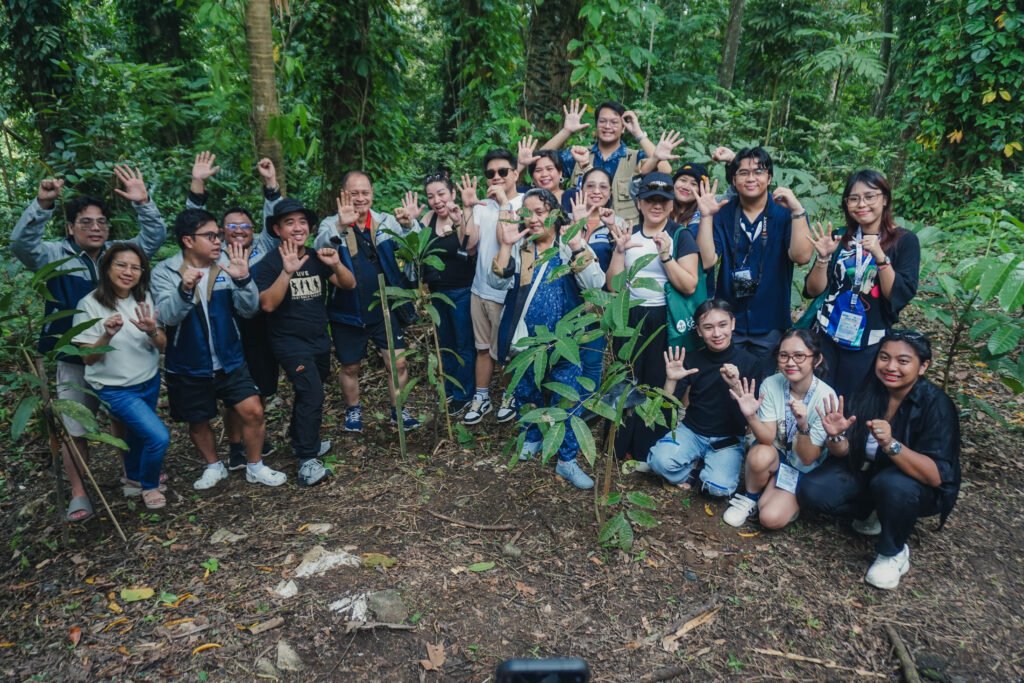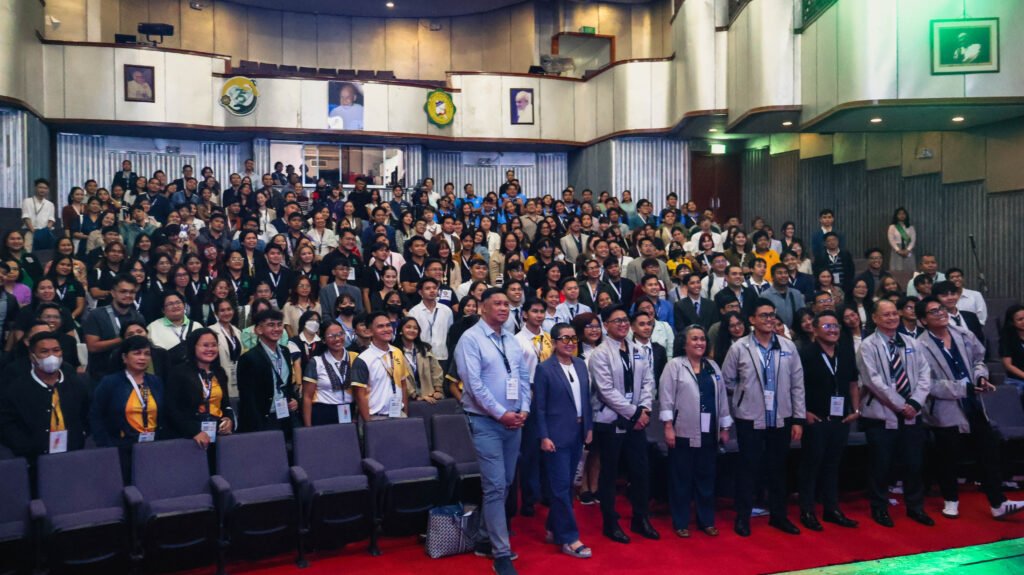PACE of the Future to PACE of the Present

by Jian Martin Tenorio
An epilogue to Crispin Maslog’s PACE Turning 50:
A History of the Philippine Association of Communication Educators
Following the footsteps of Dr. Nora Quebral and Dr. Crispin Maslog, the thirteenth PACE president hailed from the University of the Philippines Los Baños (UPLB). Mark Lester del Mundo Chico, an assistant professor from the College of Development Communication (CDC), began his term at the height of the COVID-19 pandemic, steering the organization toward the new normal as it reached its half-century of existence.
Like “PACE baby” Marco Polo, who is also an alumnus of CDC-UPLB, President Chico started his engagement with PACE at a young age. Then-PACE Vice President Dr. Madeline Suva was scouting a student to represent Luzon for the public speaking segment of Pinoy Media Congress Year 2 at Miriam College. Chico took the role, allowing him to observe how things are being done in the event. While watching the teachers who were moderating the program, the young development communication student realized that he wanted to be like them. And the rest, as they say, is history.
President Chico became a PACE member around 2009 when he was starting his teaching career at CDC. In 2011, Dr. Suva wished for someone from UPLB to serve on the Board of Trustees. Dr. Suva pushed for Chico to be elected, but it took another two years for Chico to be nominated and earn enough votes to be part of the top 15 who would form the board. In 2013, Chico was elected assistant secretary, then secretary in 2015, and then vice president for Luzon in 2019. Fast forward to 2021, in a Zoom meeting of the board, Chico was unanimously elected president after being nominated by former PACE President Dr. Gwen Pusta.
Traversing the New Normal and Beyond
President Chico was given the daunting task of leading a nationwide organization as the country was in lockdown. During the early years of the pandemic, communication schools were closed, and classes were held online.
Thankfully, his predecessor, Dr. Wen Reyes, already laid the groundwork for PACE to thrive in the virtual space by pioneering webinars in the organization. On March 12, 19, and 26, 2022, PACE held the 1st Pinoy Media Congress Digital Caravan via Zoom in cooperation with the Biliran Province State University, University of the Philippines Mindanao, and De La Salle University Dasmariñas. The limitations brought by the then-very different communication education landscape did not stop PACE from fulfilling its goal of capacitating communication and media educators, practitioners, and students from all over the Philippines.
As the country started to transition slowly toward the new normal, so was the organization. The Communication and Media Studies Conference (CMSC) held its face-to-face comeback on October 20-22, 2022, at the Centro Escolar University. For President Chico, it was “a show of force somehow that professional organizations can go back to the new normal.” The reunion of the former PACE presidents, some already in their senior years, during the event, served as the highlight of the conference.
For him, what inspired the Board of Trustees to thrive during the pandemic was their dedication and transparency. Most members of the board were teachers who also held administrative positions in their home institutions. Their respective situations required utmost synergy and acknowledgment of each other’s strengths and limitations. Through this mantra, the members’ heavy workload did not hinder their dedication to serving their fellow teachers, who they knew needed an organization that would serve their needs in capacity-building and professional development.
As such, through the pandemic and the rest of President Chico’s term, PACE was able to maintain its relevance in the field. The organization remained a partner of the Commission on Higher Education Technical Working Group in communication and development communication. PACE also continued to be a go-to for consultation among policy-making and regulatory bodies, such as the Movie and Television Review and Classification Board, National Council for Children’s Television, and the Kapisanan ng mga Brodkaster ng Pilipinas. PACE also conducted multiple Training the Teachers (T3) sessions, such as with ABS-CBN, Rappler, and the Film Development Council of the Philippines.
Strengthening the Foundations
Maintaining the organization’s relevance in the field and beyond also required strengthening the internal foundations of the organization, including its knowledge and financial assets. This duty necessitated fulfilling several of PACE’s dreams that had long been articulated during the previous terms but were only realized under the leadership of President Chico.
For one, PACE was finally able to reclaim the funds that it was not able to access back then due to problems with its Securities and Exchange Commission (SEC) registration. Before leading the organization, President Chico had already committed to fixing this problem that had spanned multiple terms.
After a very tedious process that involved multiple consultations, the organization finally overcame the issue by submitting a resolution signed by the previous and present board members, stating that the Philippine Association of Communication Educators Foundation, Inc. and the Philippine Advocates of Communication Education Association, Inc. refer to the same entity that only changed its name due to SEC registration issues.
Aside from successfully reclaiming the funds of the organization, another achievement of President Chico’s term was the setting up of a membership database system, which currently serves as a one-stop shop for PACE members. This online system is used for membership registration and renewal, event registration and payment, processing of certificates, and elections, among others.
It was during President Chico’s term that the board finally allotted funds for this project. The system is credited with streamlining the organization’s processes and saving costs in the long run. It can be accessed with the use of an exclusive lifetime permanent member identification number, an innovation that Chico implemented when he was the organization’s secretary and head of the membership committee.
The membership database, along with the more streamlined use of official emails and other initial knowledge management efforts, continuously allows the organization to remain afloat and dynamic in the ever-changing digital age.
Re-humanizing Communication Education
As the Board of Trustees under Chico came amid the pandemic, the reliance of communication students and educators on technology became more evident. PACE, as President Chico explained, saw “a need to go back to the basics,” which entailed re-humanizing communication education, a vision that guided his terms.
“Technologies are supposed to serve the needs of the people. We should not be boxed by technology. So, we thought of that particular theme for our term, and we’re carrying it over to my second term,” President Chico said.
“We want to go back to the basics. We want communication education to serve its purpose, for human beings to realize their potential, for us to use technology so that we can have a better life, we can learn, we can be educated,” he continued.
This vision informed the organization’s projects and programs. Among them are the CMSC 2022 with the theme “Humanizing Communication Education in a Digital Ecosystem,” CMSC x PACE of the Future Student Camp (PFSC) 2023 with the theme “Communication and Media Education in the Time of AI: Values, Ethics, and Practices,” CMSC x PFSC 2024 with the theme “Humanizing Communication Ecology: Locating Values in Communication Education and Media Practice,” and Pinoy Media Congress 2023 with the theme “Humanizing Communication and Media.” These events were held against the backdrop of growing disinformation, misinformation, and malinformation in the country, as well as the global rise of artificial intelligence.
In line with the vision of re-humanizing communication education, the theory and practice of development communication also informed the term of President Chico. Aside from him, fellow board members with a development communication background included Dr. Ulderico Alviola, Dr. Fraulein Oclarit, Dr. Ernest Collo, Jr., and Rechelle Ann Barraquias. The value of knowing one’s stakeholders allowed them to respond deeply to the needs of their fellow teachers. They also engaged in constant communication with the organization’s members and reflection on the growth of their field.
At the Crossroads toward the Future
All the values that informed the day-to-day operations of President Chico’s term played a crucial role as PACE welcomed its 50th year. The coming of this milestone is not without its challenges. Fifty years ago, Ferdinand Marcos Sr. was in power, ultimately altering the state of Philippine communication and media education. Now, his son holds the seat in Malacañang, requiring utmost vigilance among communication educators to avoid the mistakes that have once punctuated the field.
“There are new challenges. There are people returning to history that we continue to monitor. And we ourselves are doing what we can, what we can do to fight for what we should fight for. So, the 50 years mean a lot in the sense that a lot has happened in the past five decades. A lot has been experienced,” President Chico, whose mentors lived through the brutal dictatorship, expressed.
The young president described this rare moment as being at a crossroads, where crucial decisions have to be made. For President Chico, these decisions must be for the students, whom he described as “the future of communication education and of the country in general.”
PACE of the Future
As such, President Chico embarked on the challenging mission of future-proofing the organization. His term gave way to the PFSC, which serves as a platform for communication students to showcase their abilities, experiences, projects, and achievements with their fellow students, experts, and potential collaborators in the field. PFSC, which he passionately described as his term’s legacy, aims to ensure the constant arrival of a new breed of young and empowered communication educators, who, like him, will start their engagement with PACE at a young age and hopefully, become its leaders in the future.
“If you want to future-proof the organization, the board, the members, the new breeds of teachers need to be given the opportunity to serve, to learn, to have a position, so that they can also develop and mentor the next generation. Because we’re not forever communication teachers, or we’re not forever in our institutions, or on the board, or in PACE, right? We’re also growing,” President Chico explained.
This initiative was very close to President Chico’s heart, as someone whose engagement with the organization started when he was a student dreaming of becoming a communication educator.
“I want the future of PACE to be more engaged, to showcase their talents, to have an opportunity to learn from experts in the field, outside their classrooms, etc., to be able to engage and get to know the people with whom they may be working in the future,” President Chico shared.
Now, PFSC focuses on the impact, sustainability, replicability, and potential for collaboration of student-led projects. Due to the overwhelming response from various colleges and universities in the previous iterations of the event, more camps were added.
Ultimately, through PFSC, PACE aims to establish an alliance of student-led communication organizations that will not only secure the future of the organization but also enrich the future of the field of communication in the country.
A Full Circle Moment
Indeed, President Chico’s term was marked by multiple milestones that strengthened PACE amid the challenges of the pandemic and the rapidly evolving digital age. His leadership involved the realization of many of the organization’s long-standing dreams, from reclaiming funds to establishing a membership database system.
President Chico, who is now assistant vice president for public service of the UP System and concurrently the director of the UPLB Media and Communication Office, is set to accomplish another milestone for the organization as he ends his term–the celebration of the 50th anniversary of PACE in no less than his home institution, UPLB.
“I am just excited to come home to UPLB… There’s no better place to be in on our 50th anniversary than in a place where four out of 13 presidents came from, which is UPLB… I’m excited to cap off my term here at UPLB,” President Chico ended.


